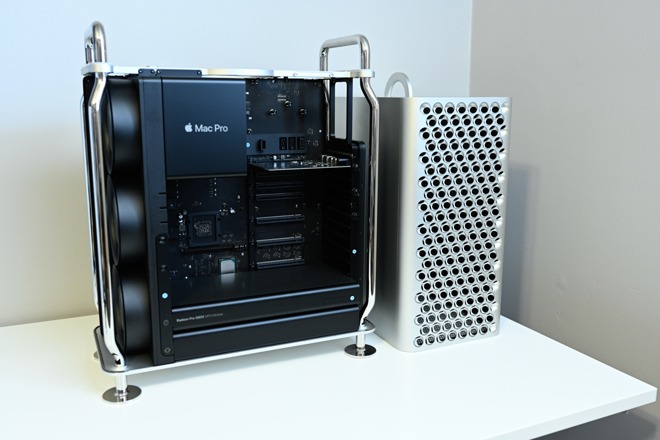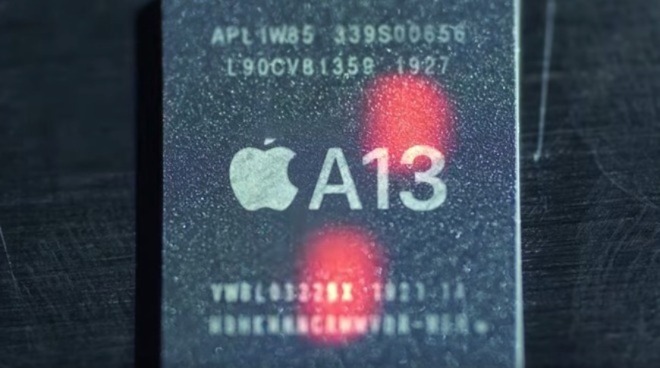ARM Mac Pro coming sooner rather than later, says Jean-Louis Gassee
Jean-Louis Gassee has changed his mind about the ARM Mac shift, and now believes that an ARM Mac Pro is the inevitable endpoint -- and is not that far away.

The Mac Pro with the case removed
According to Gassee, the ARM Mac is on its way. In a change of mind, he now agrees with Ming Chi Kuo's own 12 month to 18 month timeline for the first ARM Mac to shift.
Gassee's primary concern, however, is now not if it will happen, but how Apple will handle such a transition.
The previous transition from PowerPC to Intel took about a year, and every single new Mac sold was on Intel at the end. This was possible because the market was much smaller and much less complicated than the market of today.
Gassee suggests that, while the entire Mac line could easily shift to ARM, a single outlier raises an issue -- the Mac Pro. While Apple's A-series chipsets are worthy contenders against most consumer laptop chipsets, they still do not hold a candle to the Xeon chips used for the top-of-the-line Macs.

Apple ARM chips already perform better than most consumer Intel chips
This would create a development fork, meaning that while the rest of the Macs could flourish on ARM, a single Intel Mac would remain to satisfy Apple's most needy customers. However, that would only need to happen if ARM could not compete with Xeon, which is not the case.
As brought up by Gassee, a company called Ampere Computing already produces powerful ARM chipsets. This company produces chips with similar performance to Intel Xeon at half of the consumed power -- 201 watts versus the 400 watts needed by Xeon.
Another interesting tidbit brought up by Jean-Louis Gassee is the fact that TSMC makes these ultra-powerful ARM chips for Ampere, meaning Apple only need invent one themselves to begin manufacturing their own.

The Mac Pro with the case removed
According to Gassee, the ARM Mac is on its way. In a change of mind, he now agrees with Ming Chi Kuo's own 12 month to 18 month timeline for the first ARM Mac to shift.
Gassee's primary concern, however, is now not if it will happen, but how Apple will handle such a transition.
The previous transition from PowerPC to Intel took about a year, and every single new Mac sold was on Intel at the end. This was possible because the market was much smaller and much less complicated than the market of today.
Gassee suggests that, while the entire Mac line could easily shift to ARM, a single outlier raises an issue -- the Mac Pro. While Apple's A-series chipsets are worthy contenders against most consumer laptop chipsets, they still do not hold a candle to the Xeon chips used for the top-of-the-line Macs.

Apple ARM chips already perform better than most consumer Intel chips
This would create a development fork, meaning that while the rest of the Macs could flourish on ARM, a single Intel Mac would remain to satisfy Apple's most needy customers. However, that would only need to happen if ARM could not compete with Xeon, which is not the case.
As brought up by Gassee, a company called Ampere Computing already produces powerful ARM chipsets. This company produces chips with similar performance to Intel Xeon at half of the consumed power -- 201 watts versus the 400 watts needed by Xeon.
Another interesting tidbit brought up by Jean-Louis Gassee is the fact that TSMC makes these ultra-powerful ARM chips for Ampere, meaning Apple only need invent one themselves to begin manufacturing their own.

Comments
It can be done.
The writing is on the wall. And the floor. And the ceiling. And...
ARM has always been about mobility. If it has a battery it will eventually have an ARM processor in it, but for a looong time MacBook Pro will be Intel. Anyone that uses Boot Camp will buy the Pro model.
As a software developer and hard-core audio/video editor, I'm hoping they allow mixing ARM-based and Intel x86-64 based cores.
Imagine a MacBook Pro that has 32 or 64 ARM cores, but also a Core i9 so that you can run Parallels and still have integrated Linux/Windows on your laptop, while the ARM cores would sip power when you don't need anything Intel draining the battery.
...or a Mac Pro that has a pluggable x86-64 CPU complex that allows you to plug in an EPYC 64-core module to work alongside your 64 core ARM64 main processor.
Is Gassee former Apple?
Works fine with XCode.
I have seen him at an Apple session in Amsterdam.
I know its someone with software expertise, one of the best I think.
twatwaffle comment. you know who he is, right?
https://mondaynote.com <-- bookmark it. educate yourself, you're welcome. lol
his site is absolutely one of the best. analytical, thoughtful, insightful.
knows waaaay more than you will ever know. lol
idk. lets ask the super engineers at Apple. pretty sure they're way ahead on this.